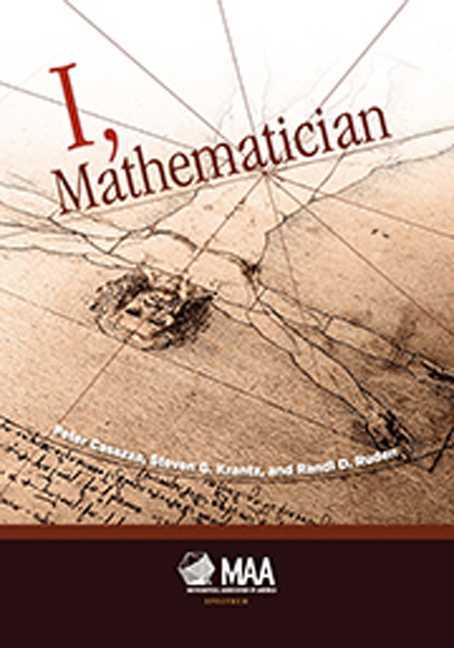Book contents
- Frontmatter
- Contents
- Preface
- Part 1 Who Are Mathematicians?
- Part II On Becoming a Mathematician
- Part III Why I Became a Mathematician
- Foreword to Why I Became a Mathematician
- 20 Why I Became a Mathematician: A Personal Account
- 21 Why I Became a Mathematician?
- 22 Why I am a Mathematician
- 23 Why I am a Mathematician
- 24 Why I am a mathematician
20 - Why I Became a Mathematician: A Personal Account
from Part III - Why I Became a Mathematician
- Frontmatter
- Contents
- Preface
- Part 1 Who Are Mathematicians?
- Part II On Becoming a Mathematician
- Part III Why I Became a Mathematician
- Foreword to Why I Became a Mathematician
- 20 Why I Became a Mathematician: A Personal Account
- 21 Why I Became a Mathematician?
- 22 Why I am a Mathematician
- 23 Why I am a Mathematician
- 24 Why I am a mathematician
Summary
I became a mathematician because of my kindergarten teacher.
That claim may surprise you if you know something of my family history. My mother, Mary L. Boas, was a professor of physics at DePaul University in Chicago. My father, Ralph P. Boas, was a professor of mathematics at Northwestern University and a prominent researcher, teacher, writer, editor, and translator; he was active in the affairs of both the American Mathematical Society and the Mathematical Association of America. With such parents, had I not a predetermined future? I think not, for my two siblings showed no inclination to pursue a scientific or an academic career.
Certainly all three of us children were profoundly influenced by our parents’ passion for teaching and learning. We absorbed by osmosis the conviction that every craft can be mastered through diligence. For instance, we observed that when our parents took up photography, theywent so far as to convert the utility closet into a home darkroom to develop their own film; their gardening activities expanded to include forcing bulbs under lights in the basement, building window boxes, and constructing cold frames in the backyard; they taught themselves how to work with fiber glass in order to maintain a succession of small sailboats. My father took pride in being able to shingle a barn, to fell a tree, and to miter a joint; my mother knew how to sew her own clothes, to make beach-plum jelly, and to wring a chicken's neck.
As the youngest child, I felt overshadowed by my accomplished siblings. Both of them mastered the unicycle and the trampoline; in sailing camp during the summer, they learned the ropes well enough to participate in regional regattas; my sister took up horseback riding and brought home ribbons from competitions; my brother learned both slalom and trick skiing and participated in water-skiing meets. Being younger and smaller, I could not match my siblings in athletic pursuits, so I turned to more cerebral activities—especially chess, in which I was nationally ranked in my age group during high school.
Now there are many attractive intellectual endeavors besides mathematics, so what happened in kindergarten that set the course of my life? Before reaching school age, I picked up knowledge at home in the haphazard way of young children.
- Type
- Chapter
- Information
- I, Mathematician , pp. 255 - 256Publisher: Mathematical Association of AmericaPrint publication year: 2015
- 1
- Cited by

